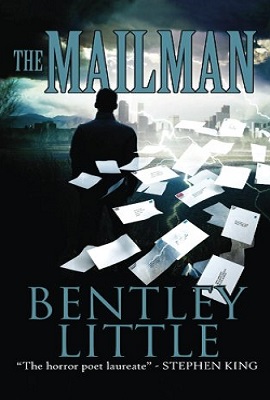Book Review: The Mailman by Bentley Little
 Bentley Little’s novel The Mailman (not to be confused with Little’s short story “The Mailman”) is set in the small town of Willis Arizona, where trouble arrives in the form of a new mailman. The town’s previous mailman, a guy named Bob Ronda, had been doing the job for years and was about as reliable as you could get. The people of Willis never had a bad word to say about him. Then Bob decided to suck on his shotgun and blew himself away in an act of suicide that was a messy as it was unexpected.
Bentley Little’s novel The Mailman (not to be confused with Little’s short story “The Mailman”) is set in the small town of Willis Arizona, where trouble arrives in the form of a new mailman. The town’s previous mailman, a guy named Bob Ronda, had been doing the job for years and was about as reliable as you could get. The people of Willis never had a bad word to say about him. Then Bob decided to suck on his shotgun and blew himself away in an act of suicide that was a messy as it was unexpected.
The new mailman arrives on the day of Bob’s funeral. He is called John Smith and Smith is the only person at the funeral who is not wearing black. He is wearing a blue postal worker’s uniform and, due to his pale complexion and shock of red hair, the blue uniform with the brass buttons up the front seems rather clownish. There is nothing funny about John Smith though, and the local school teacher, Doug Albin, has a bad feeling about the new mailman right from the start.
Doug is the main viewpoint character in the story. Other viewpoint characters include Doug’s wife, Tritia, and their young son, Billy, but Doug is the first person to suspect there is something sinister about the new mailman and that he may be tampering with the town’s mail.
At first, it is the bills that worry Doug—where are they? The bills have stopped coming in, so has all the other bad mail, and there has been a sudden influx of good mail. Friends who have moved away from the area begin writing to the Albins again (or do they?) and Doug receives a letter informing him that the warranty on their Bronco powertrain has been extended for a year—for free! Tritia receives a subscription to the Fruit-of-the-Month Club courtesy of an anonymous donor, while Billy gets letters from both of his grandmothers and each letter has money inside. None of this sits well with Doug. It is not normal for the only news to be good news and he knows the bills are due.
Then one night the power goes out and the Albins cannot ring the suppliers because the phone is not working either. The next morning the water stops as well and Doug is forced to go down to the Department of Water and Power to find out what the hell is happening. You are probably thinking that the problem is because Doug has not paid his bills. That is not the problem—not yet anyway. That comes later. The problem is a little more disturbing and Doug is very surprised when the girl behind the counter shows him the letters, supposedly written by him, informing the Department of Water and Power that he is moving to California, and requesting his supply be cut off.
Doug is not a happy chappy. He is less happy still when the girl mentions a reconnection charge. Fortunately, Doug manages to get that charge waived, but the phone company, who have received a similar letter, are less accommodating and will not resume services until he coughs up twenty-five dollars.
The Albins manage to get their utilities back, but keeping everything up and running is another matter entirely and they are not the only ones having trouble. The whole town is having problems of one sort or another and Doug knows who is responsible—the mailman.
Throughout the town, bills are a thing of the past, all of the good mail has turned bad, and people are receiving letters that are written about them instead of to them—as if the sender had placed the letter in the wrong envelope by mistake. Needless to say, the content of these letters is not exactly flattering to the recipient and a lot of bad blood is causing pressure in the town. Doug’s friend Hobie even starts getting letters from his younger brother, who died in Vietnam in the sixties, and those letters contain things that threaten to drive the poor man out of his mind. In a case like this, it would seem that no news would be very good news indeed, but the letters keep coming and—worse still—Doug is beginning to suspect the mailman may not even be human.
This theme of an outside influence entering a community and trying to destroy it is one that I have seen before. Little uses it quite often and nobody does it better. In his book The Store, for instance, the visiting evil is a supermarket chain. This time the evil force is a mailman, and it is a very clever story. One of the interesting things about the story is the way that the evil newcomer, though responsible for all the problems in Willis, works his evil magic by acting as a catalyst that brings out the worst in people and causes them to do some pretty horrific things to each other. Bentley Little is a very talented writer and, if you have never read any of his work, this one might be a good place to start. The Mailman is 440 pages long and guarantees a special delivery of fear that is first class all the way through.
~~~
